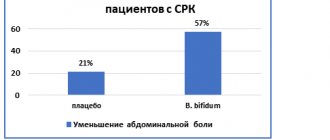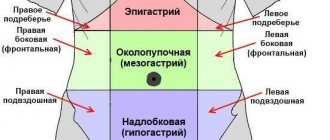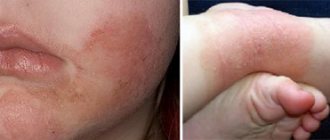09/23/2019 Reading time: 6 min 5573 0
- The main causes of regurgitation in children
- Pathological regurgitation
- How to distinguish regurgitation from vomiting
The most common cause of regurgitation is the structural features of the developing esophagus and stomach in a child in the first half of life, in particular weak muscles of the sphincter (valve) of the esophagus at the junction with the stomach. And the esophagus itself is relatively short and wide. The esophagus and stomach of a child at this age are compared to an “open bottle.”
Therefore, when overeating and (or) excessive air entering the stomach, when the child eats hastily and swallows air along with milk (or cries a lot before feeding), food from the stomach easily moves back into the oral cavity.
Regurgitation is observed, according to various sources, in 80–100% of infants under the age of 3 months. This is normal.
For example, American scientists estimate that regurgitation occurs in 100% of children aged 0 to 3 months, and in 20% of children it continues during the first year of life. In this case, the frequency of regurgitation after feeding ranges from 18 to 50%. In most children, regurgitation disappears or becomes much less frequent by the 4th–6th month of life.
Regurgitation, or regurgitation, is essentially the reflux of stomach contents into the pharynx, esophagus, and then into the oral cavity. Unlike vomiting, regurgitation is a passive process, that is, the muscles of the anterior abdominal wall, diaphragm and stomach are not involved in it. If a child spits up occasionally after feeding, this is normal and does not require special examinations, much less treatment.
It is important to understand two things. The first is how regurgitation (a natural process) differs from vomiting (can be a symptom of disorders in the body and diseases). The second is in what case even regurgitation is a reason to be wary. We'll talk about this below.
The main causes of regurgitation in children
The main causes of regurgitation in newborns are described below. These causes cover the vast majority of cases of regurgitation in infants.
Weakness of the sphincter muscles
, which separates the esophagus and stomach. As we already wrote at the beginning of the article, this is the most common, main and absolutely natural cause of regurgitation. The sphincter muscles are not sufficiently developed, due to which it does not always cope with its task - to hold food inside the stomach and prevent it from falling back into the esophagus. As the child grows older, this reason disappears by itself.
Excess food in the stomach.
The baby eats too often. As a result, the stomach becomes full and regurgitation occurs. This can happen both with breastfeeding and with artificial feeding.
Air entering the stomach.
The air that a child can swallow along with food creates excess pressure in the stomach, which provokes regurgitation. Most often, air enters the stomach in the following situations:
- The child eats too quickly.
- The baby has a stuffy nose and has to breathe through his mouth, including while eating.
- The baby cried before feeding - as a result, swallowing milk, he may sob and gasp for air.
- The baby is distracted (for example, by loud noises) and sucks unevenly.
Incorrect feeding.
If a child eats lying down or lies down immediately after eating, the contents of the stomach freely exit into the esophagus and then into the oral cavity. A few tips will help reduce the number of regurgitations for this reason:
- Feed your baby in a half-sitting or half-lying position, at an angle of 45 degrees.
- It will be better if you hold the baby upright for some time after eating.
- If you still need to put the baby down after eating, place him on his back so that nothing puts pressure on his stomach.
Why does a baby spit up after breastfeeding?
Main reasons
Often, the cause of regurgitation depends on the chosen feeding method: whether the mother attaches the baby to the breast or feeds from a bottle.
When breastfeeding:
- Overfeeding the baby. If a baby eats too much, the excess milk naturally comes out.
- Incorrect breastfeeding technique, as a result of which a large amount of air enters the baby’s stomach along with milk. Try to hold the baby so that he fully latches onto the nipple and can still breathe freely through his nose.
- Features of the digestive system of children at an early age. In infants up to one year old, the esophageal muscles are not yet fully formed, so regurgitation is often a natural process.
- Abrupt change in the child's position. After feeding, you should not turn your baby over, cuddle, swaddle or rock him in a stroller.
- Intestinal dysfunction, such as bloating, colic and other causes that interfere with normal digestion.
- In rare cases, serious diseases of the digestive system.
Note that regurgitation is more often observed not in newborns, but in children aged about 4 months.
When artificial feeding:
- Abrupt transition from breast milk to formula.
- Inappropriate size and hole of the nipple, due to which the baby takes in a lot of air.
- Tendency to overeat. You should follow the nutritional standards for babies.
- Inappropriate formula milk. Perhaps the child simply does not tolerate it well; consult a doctor about changing baby food.
Valio Baby adapted milk formulas are as close in composition as possible to breast milk and contain prebiotics, vitamins and microelements necessary for intestinal health. All Valio Baby components are natural. The balanced composition allows you to maintain cholesterol levels in the child’s body at an optimal level. The mixtures are designed for three age categories, taking into account the developmental characteristics of babies in a given period:
- from the first days of life to six months;
- for babies from six months to 1 year;
- and for children over 1 year old.
First aid
If the baby is lying on his back and begins to spit up, immediately turn him over on his stomach or pick him up - this will prevent food from entering the respiratory tract. If you think your baby is uncomfortable while feeding, or if he pulls away from the breast and starts crying, let him burp. This can be done in two ways:
- Place a napkin on your shoulder to avoid getting dirty. Hold your baby on your chest with his chin resting on your shoulder. Gently pat or pat his back with your palm.
- Place the cloth on your lap. Turn your baby over onto his tummy and position him perpendicular to your body. Support your chin with one hand and pat or rub your back with the other. Please note that the child's head should be higher than other parts of the body so that blood does not rush to it and food does not enter the respiratory tract.
When you need a doctor
As a rule, regurgitation 6-8 times a day (in small portions) does not pose a health hazard. Over time, when the baby's muscles become stronger, he will digest food better. Most children stop spitting up after 6-7 months, but in some situations this problem occurs up to one year. If regurgitation is constant and strong, prevents weight gain, and the child cries after this process, then you should consult a doctor. Such symptoms may indicate that the baby’s walls of the esophagus are irritated. Contact your doctor immediately if your child begins to vomit suddenly and profusely. This may indicate either the presence of food poisoning or a disease associated with deformation of internal organs. If a baby vomits with greenish bile, it may be a sign of intestinal blockage, which requires immediate hospitalization and possibly even emergency surgery. Prevention
If your newborn spits up a lot after feeding, follow these recommendations:
- You should not feed your baby while he or she is lying down or in a car seat, as the milk or formula may not reach the stomach.
- Create a calm atmosphere. Keep noise and other distractions to a minimum. If your baby is distracted and bothered by something, there is an increased risk that he will swallow large amounts of air through formula or breast milk. For the same reason, do not allow your baby to be very hungry.
- Make sure there is nothing pressing on the baby's tummy. Make sure his clothes and diaper are not too tight.
- Try to avoid traveling in a car immediately after feeding.
- Hold the baby for about 30 minutes. in an upright position after he has eaten.
- When breastfeeding, make sure that your baby is latching correctly (his lips should cover not only the nipple, but also the areola as much as possible).
- If you are feeding formula or bottle-fed expressed milk, make sure the nipple opening is not too small - this may prevent your baby from drinking and lead to air swallowing. The hole should not be too large to prevent the child from choking.
- Don't overfeed your baby. Try feeding him less milk or formula. Observe the reaction. The baby may agree to drink less at a time, but will want to eat more often.
If regurgitation occurs frequently, after each feeding, consult your doctor.
Pathological regurgitation
If a child spits up often and in large quantities, and not only after feedings, but also during daytime and night sleep, one may suspect the presence of health problems. If it seems to you that regurgitation occurs too often and even at night, watch the child, or better yet, record for several days how often (time of regurgitation) and approximately in what volume they occur. This will help the pediatrician give an answer during the next examination whether it is worth worrying and start undergoing examinations. For example, the following causes of regurgitation can be identified.
Malformation of the digestive organs.
As a rule, these defects are detected in the maternity hospital. We can talk about violations of the patency of the esophagus and stomach. With such defects, regurgitation occurs profusely and often, sometimes repeatedly after one meal.
Food allergies.
An allergy to cow's milk protein is quite common - in this case, after consulting a doctor, a bottle-fed child is transferred to formulas with highly hydrolyzed protein.
The mother of a breastfed child has her diet adjusted to the exclusion of cow's milk proteins.
Gastroesophageal reflux disease.
This disease is suspected when regurgitation occurs frequently and in large volumes, day and night, does not decrease by 6 months and does not go away after a year.
When does regurgitation indicate abnormalities?
Digestive problems
In this situation, in addition to regurgitation, the baby will be bothered by other symptoms: colic, bloating, problems with stool. After eating, the child will become restless and cry. This may be due to lactase deficiency or deficiency of other digestive enzymes.
Infectious diseases
The baby will experience not just regurgitation, but vomiting. It is not always possible to immediately distinguish between these two processes. Vomiting occurs on a larger scale than simple regurgitation. And it will not always be associated with feeding. When vomiting, milk is pushed out of the stomach under pressure. When burped, it simply flows gently out of the baby's mouth. In the event of an infectious process, the general condition of the child will also worsen. Vomiting may be accompanied by loose stools, increased temperature, moodiness and lethargy, and the presence of mucus in the regurgitated masses.
Neurological disorders
Regurgitation occurs in a fountain, is observed after each feeding, it intensifies after 6 months of age or continues after 1 year. Regurgitation may be accompanied by tremors of the limbs, drowsiness, and throwing the head back during sleep.
Pathologies of the digestive tract. Against the background of regurgitation, the baby does not gain weight, is capricious, has no appetite, and stool retention occurs for several days. There may also be regurgitation of the entire portion of milk eaten.
If such conditions exist, the child requires immediate assistance from a pediatrician. Only a doctor can tell how serious the deviation is and whether it exists at all. If 2-3 of the listed symptoms appear, self-medication is strictly prohibited. You should immediately call a doctor, he will prescribe the necessary examinations and treatment if necessary.
How to distinguish regurgitation from vomiting
Vomiting is sometimes difficult to distinguish from regurgitation, especially if the regurgitation is profuse - as some mothers say, “a fountain.” However, after observing the child for some time, you can quite clearly distinguish between these 2 phenomena.
- Regurgitation occurs during or immediately after eating. Vomiting occurs regardless of food intake.
- Regurgitation usually occurs once. Vomiting can be repeated, in several approaches.
- Regurgitation may upset the baby to the point of crying, but overall regurgitation does not make the baby feel worse. Vomiting is often accompanied by a general deterioration in condition: the child turns pale, becomes lethargic, is more often capricious, sweats profusely, and has increased salivation.
If regurgitation according to these signs is similar to vomiting, do not delay contacting a doctor. Vomiting is usually a symptom of disease or disorder in the body.
If the child is bottle-fed, we recommend paying attention to a specialized product - Nutrilak Antireflux.
(14 ratings; article rating 4.3)
Share Share Share
Other options
In a healthy child, regurgitation after feeding is a normal, physiological process associated with the release of excess gases from the intestines. Therapy will be required if belching turns into vomiting.
Belching or vomiting
How to distinguish between simple release of excess air and gagging:
- Gases come out of the baby only after the feeding process. The occurrence of vomiting does not depend on the hours of nutrition or rest.
- Vomit is sometimes yellow in color because accumulated bile is released along with food.
- During burping, the amount of food leaving the newborn's stomach is small. When vomiting, the discharge is copious.
Any parent should remember: if symptoms of vomiting develop, you need to seek medical help as soon as possible to diagnose and prescribe adequate treatment.
When is the best time to see a doctor?
In addition to vomiting, other reasons are noted that indicate the need to diagnose an infant:
- Significant weight loss.
- Irritability and restlessness.
- Constant crying.
- Poor sleep and appetite.
- Regurgitation occurs with large amounts of food.
A change in the color of the discharge is examined; it is necessary to prevent the occurrence of pathology in the internal organs responsible for digesting food.
Pyloric stenosis
Abnormalities in the stomach are a congenital disease. With pyloric stenosis, a narrowing of a certain area of the organ occurs. The result is frequent loss of air, hiccups and lack of weight gain.
Hernia
The occurrence of a hernia anywhere on the surface of the diaphragm contributes to compression of the intestines. There is pressure on the stomach, food goes back.
CNS dysfunction
Improper functioning of the central nervous system in newborns occurs during difficult childbirth. Additional causes include difficult pregnancy and congenital defects. Symptoms appear: frequent whims, profuse sweating, intestinal colic, regurgitation and excessive gas formation.
Infection
The appearance of an infectious disease in the body also contributes to the manifestation of belching. Meningitis provokes inflammatory processes in the human brain, hepatitis disrupts the functioning of the liver.
Heredity
Heredity plays an important role in the manifestation of symptoms. If a child has a predisposition to systemic disorders of the functioning of internal organs, their frequent manifestation is quite natural.
Kidney damage
Pathological processes occurring in the kidneys of a newborn can cause belching and disruption of the digestive system.
Poisoning
Food poisoning not only in children, but also in adults causes discomfort and discomfort. Discharge of an unpleasant odor, with a yellowish tint. There are blood spots in the stool.
The occurrence of any symptom that goes beyond the norms of a healthy reaction of the body cannot be treated with home methods. Consultation with a doctor and diagnosis is required.
How to reduce spitting up
It is not possible to completely get rid of the natural process of returning food, but you can make this process easier for the baby and parents.
- Carry your baby upright after feeding. This way, the air he swallowed during feeding will come out faster.
- Make sure that the baby covers the entire circumference of the nipple. Then air will not penetrate when sucking.
- Use anti-colic nipples when bottle feeding. They are designed to keep air out.
- After feeding, do not entertain the baby, let him be alone for a while.
- Try feeding for a little less time to prevent overeating.
- Give your baby a pacifier before bed to stimulate digestive activity for a while after eating.
- Provide your baby with more movement: exercise, massage, swimming, tactile contact, walks in the fresh air. So that the muscular system develops more actively. All internal organs will develop along with it.
There is no medicine that will reduce regurgitation. Because this is not a disease, it is either a symptom or a natural process.
The only thing that can affect the amount of food returned is the use of anti-colic drugs, which reduce gas formation in the intestines. Their use is justified only if the baby is tormented by gas. Pay attention to the Israeli drug for colic Simicol, which is suitable for infants from birth.






